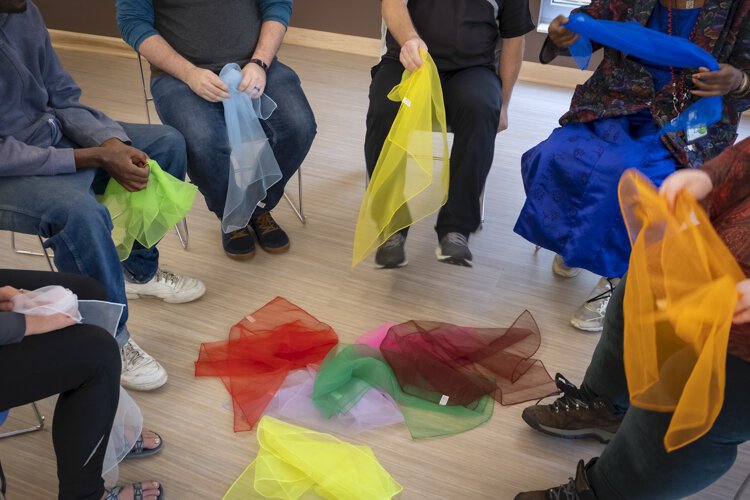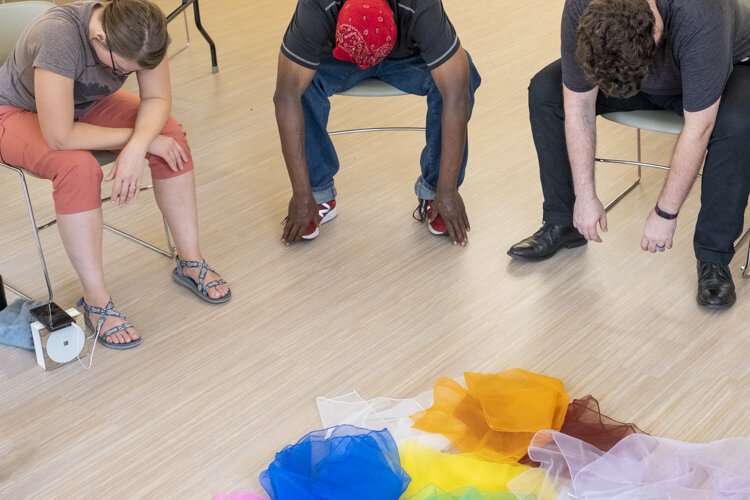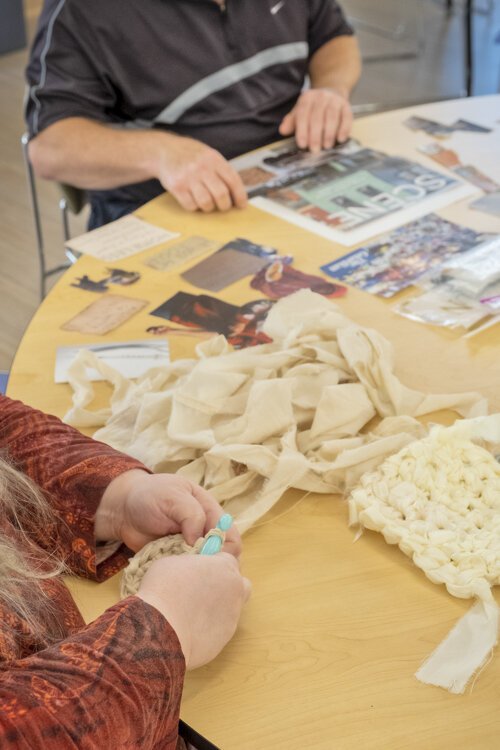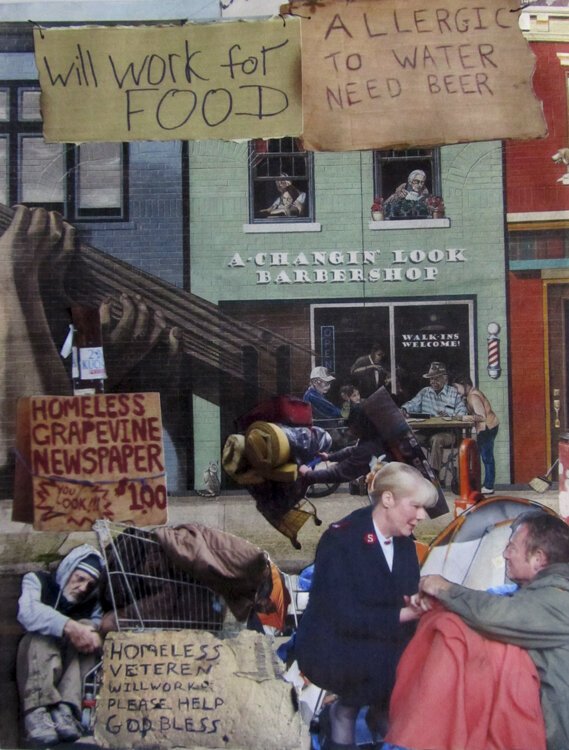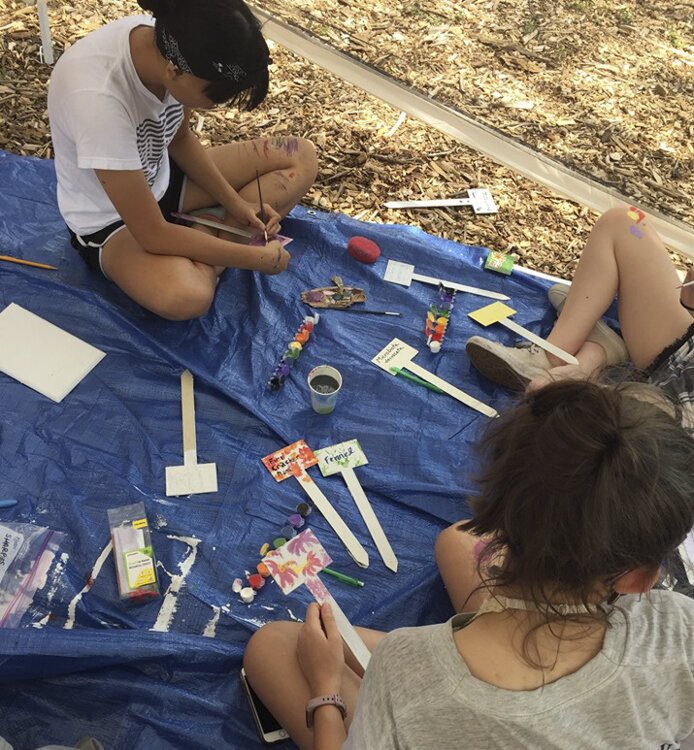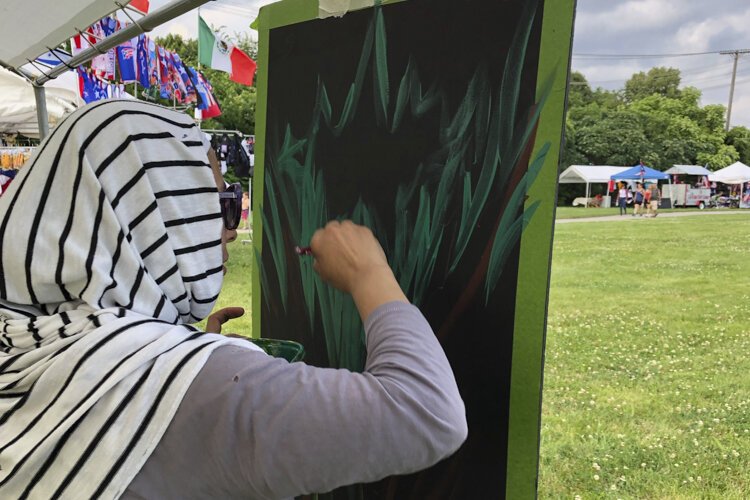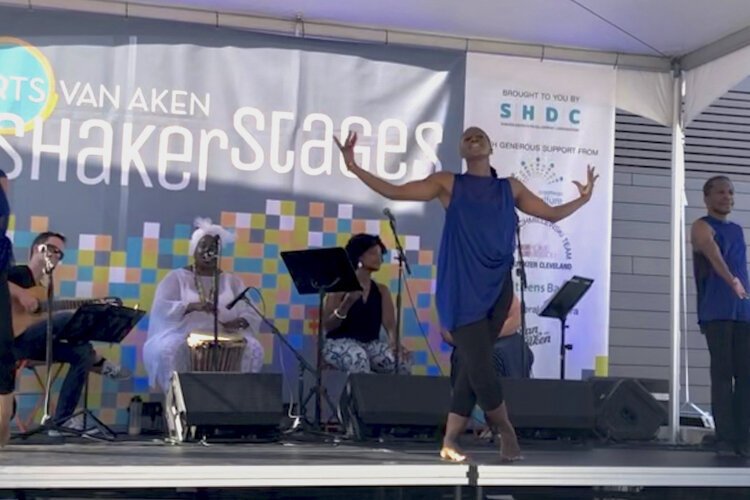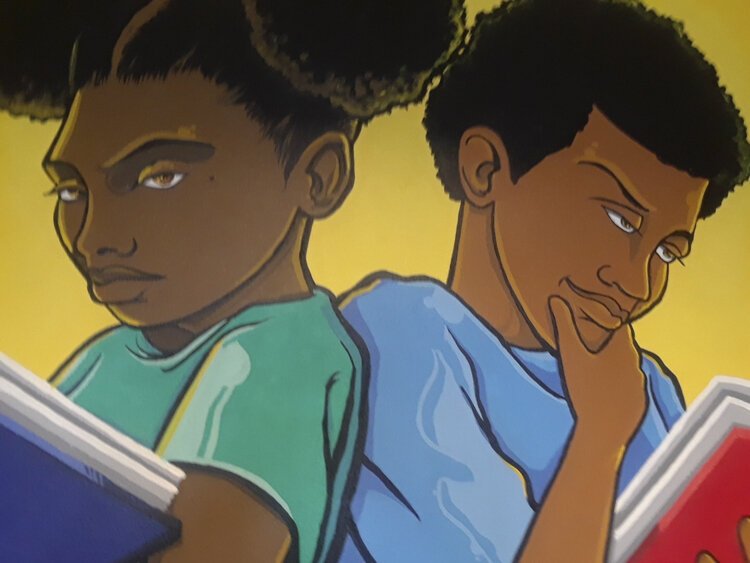Cuyahoga Arts & Culture’s Learning Lab launches into second session
When art meets social cause, good things appear. That’s the sentiment behind Cuyahoga Arts & Culture's Learning Lab program. It pairs local artists with nonprofit civic organizations that train them in civic, social, public, and placemaking practices. In this way, works of art are created that help both the organizations and the clients they serve.
The arts funding agency worked with the national organization Center for Performance and Civic Practice to create and implement its own Learning Lab workshop series, and in November 2018 launched its first Learning Lab with 12 artists and 11 organizations. The matchmaking process let each group or artist make a list of their top choices before pairing them up.
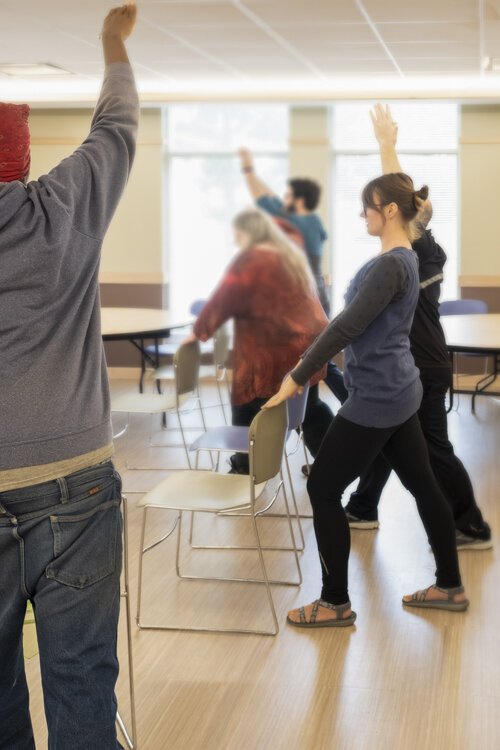 FrontLine Mindful movement, relaxation class“CPCP’s Learning Lab has been an integral part of our Support for Artists program in 2019,” says Jill Paulsen, Cuyahoga Arts & Culture’s interim CEO and executive director. “After working together for many years, it was great to have CPCP share their expertise in building artist and community partnerships in Cuyahoga County.”
FrontLine Mindful movement, relaxation class“CPCP’s Learning Lab has been an integral part of our Support for Artists program in 2019,” says Jill Paulsen, Cuyahoga Arts & Culture’s interim CEO and executive director. “After working together for many years, it was great to have CPCP share their expertise in building artist and community partnerships in Cuyahoga County.”
Cuyahoga Arts & Culture, widely known in the arts community as CAC, provided $7,500 grants for each of the 12 projects—with $4,500 of each grant going to the artist.
The groups are working together through the end of the year on various projects. They range from the efforts of outdoor educator Tom Maseveg and FutureHeights to create a mini-park off of Lee Road in Cleveland Heights that uses augmented reality, to the Asomdwee Arts project, a collaboration between Mt. Pleasant NOW Development Corporation and artist mr.soul, a mural that depicts African-American history and helps inject pride into the neighborhood.
“The lab not only builds connections between artists and cultural nonprofits, but it provides important skills for partnership and meaningful project funding for artists,” says Paulsen.
In fact, the Learning Lab program has been so successful that CAC is about to launch another Learning Lab with a new group of artists and nonprofit community organizations, Paulsen says. The 2020 lab gets started with an informational session, Tuesday, Oct. 29, when applications will be available.
“As we look to 2020, we’re thrilled to bring the Learning Lab back to Cleveland to train an additional 12 artists and 12 nonprofit leaders,” says Paulsen. “The projects that result from this program are deeply collaborative and leverage the unique skills of artists to improve our community and tackle important issues.”
FreshWater Cleveland looks at three projects that have accomplished not only some beautiful artwork but also made lasting relationships and promote causes close to their hearts.
Planting seeds
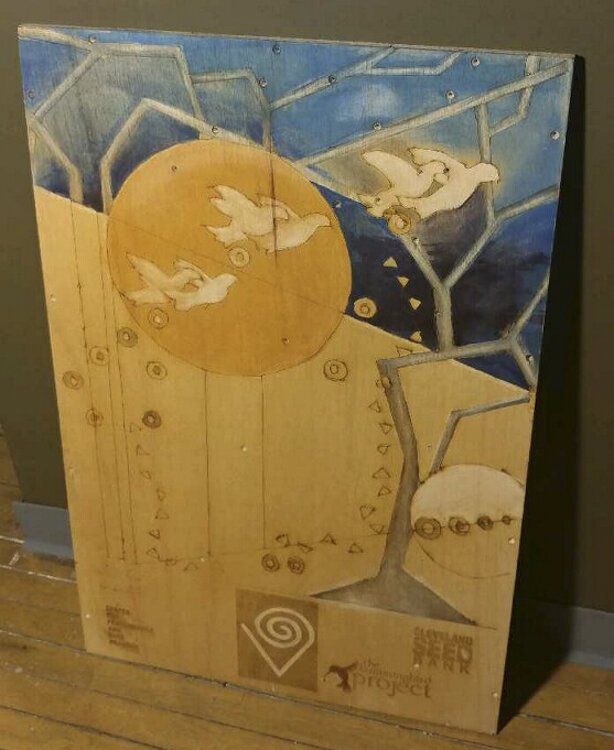 The mobile seed separator teaches people how to separate seeds from their chaffs.Chris Kennedy, co-founder of the Hummingbird Project and Cleveland Seed Bank (the domestic arm of the international Hummingbird project), which educates and empowers Clevelanders toward a locally adapted seed supply, was looking for a way to make a do-it-yourself seed separator when he heard about Learning Lab.
The mobile seed separator teaches people how to separate seeds from their chaffs.Chris Kennedy, co-founder of the Hummingbird Project and Cleveland Seed Bank (the domestic arm of the international Hummingbird project), which educates and empowers Clevelanders toward a locally adapted seed supply, was looking for a way to make a do-it-yourself seed separator when he heard about Learning Lab.
“We wanted to create something,” Kennedy says. “I didn’t know what to expect was going to happen, but It was clear to me that artists would be working with nonprofits.”
During the initial get-to-know-you meetings at Learning Lab, Kennedy met Gina Washington, artist and member of the Visit Arts Collective. “I work with a lot of different nonprofits anyway,” she says of her decision to join Learning Lab. “I wanted to come together and understand the language between the two [artist and nonprofit].”
Kennedy told Washington what he wanted to do: build a mobile seed separator to teach people how to separate seeds from their chaffs. “One of the things we’ve been dreaming of is a DIY seed separator,” says Kennedy. “We could have easily built it, but as a small organization, we thought, ‘Wouldn’t it be great to have it as a functional art piece?’”
Washington envisioned a community planter that would attract butterflies.
So, the pair decided to do both a planter and a seed separator. “It’s almost like two-for-one,” says Washington. “It’s a bottomless planter with flowers that attract butterflies. The planter is really echoing the shape of the Visit Arts Collective, and that is in the shape of a V.”
The seed separator has a zigzag separator system covered in plexiglass on one side, with a yellow and blue illustration on the other.
“Not only is it beautiful, a museum-quality art piece, it’s functional,” says Kennedy. The two are still putting the finishing touches on the project pieces.
Kennedy and Washington both say they are pleased with the outcome of their Learning Lab experiences, they learned some things, and are likely to continue collaborations in the future.
“My lack of knowledge about seeds and my want to know is going to make me want to work beyond the basic task,” says Washington. “I now have an awareness about what he does, and Chris had to learn about Visit Arts Collective. I think these collaborations are going to go beyond this project.”
Kennedy also says the experience opened his mind. “Connecting with Gina and the [Visit] Arts Collective opens us up to people we didn’t know,” he says. “It creates more awareness about the work we are doing. It’s been an interesting process, and we’re grateful to be involved.”
Stories of healing
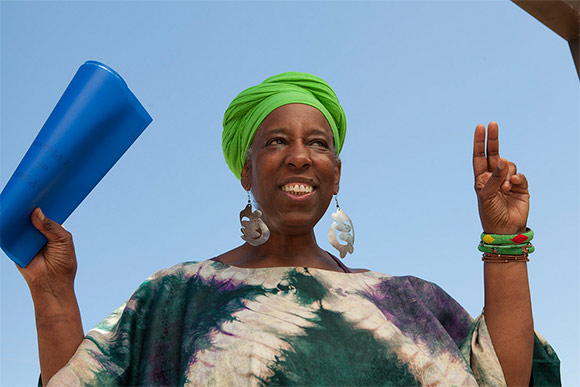 Oluremi Ann OliverAs a poet, storyteller, educator, and co-affiliate director of the National Association of Black Storytellers, Oluremi Ann Oliver knows the power in sharing a personal story of overcoming hardship and trauma.
Oluremi Ann OliverAs a poet, storyteller, educator, and co-affiliate director of the National Association of Black Storytellers, Oluremi Ann Oliver knows the power in sharing a personal story of overcoming hardship and trauma.
At FrontLine Service, Ohio’s largest continuum of care agency that addresses mental health issues and violence among the homeless, volunteer coordinator Jordan Rush also sees the healing that can occur through storytelling.
When Oliver and Rush teamed up through Learning Lab, they opened the doors to a new way to build community, heal, and share among those in FrontLine’s permanent-supportive housing facilities.
“I’ve always wanted to use storytelling more as a service-oriented art form than enlightenment,” says Oliver. “There’s nothing wrong with [storytelling as] entertainment, but that was not my goal.”
So Oliver created storytelling circles at FrontLine, in which residents could tell their stories in a safe environment and get introspection on how their experiences have affected their cores as humans. By sharing their stories in a group, Oliver says, a lot of healing and empowerment can happen.
Oliver and Rush are compiling the stories in a yet-to-be-published book that will help FrontLine employees, and others, relate to some of the experiences the homeless population goes through.
For instance, Oliver tells of one man who had been living on the streets of Cleveland for years. “He shared he felt that being on the street, it was his mission to protect the women [also] being out there on the streets,” she says. “If he saw a woman on a bench, he would position himself nearby so he could protect her. There’s a high level of respect among them, and a high level of concern, or care, for them.”
Oliver says just about every issue surrounding homelessness—like mental health or schizophrenia—is addressed in the stories shared. “People around them are very compassionate and didn’t ridicule them for that, condemn them for the situations they’re in,” she says of the participants. “They’re just very respectful of each other.”
The storytelling participants realize they were mostly overlooked by mainstream society when they were homeless, Oliver says. “For most people, we don’t look at them, we kind of avoid them,” she says of the homeless. “We might give them a dollar or some change if they’re panhandling, but we don’t look at them as people.”
Working with FrontLine has affected her personally, she says. “For me, it’s been rewarding,” she says. “It might be the most rewarding work that I’ve done in my life. It’s changed my worldview.”
Oliver would definitely participate in Learning Lab again and wants to expand her storytelling circles to additional underserved groups, she says. “I want to be in situations where more of that happens,” she says, “seeing the benefit of sharing stories together in a mutually beneficial process.”
Relaxation, crocheting, and art
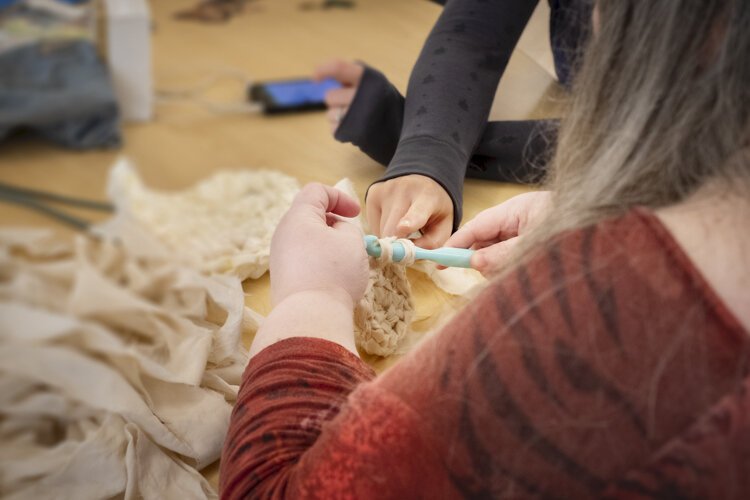 Hullihen has taught the residents to crochet.Multimedia artist Elaine Hullihen also paired up with FrontLine to conduct an ongoing series of classes with the agency’s permanent-supportive housing residents that combine relaxation, stretching, and movement exercises with art to help participants de-stress and engage in activity.
Hullihen has taught the residents to crochet.Multimedia artist Elaine Hullihen also paired up with FrontLine to conduct an ongoing series of classes with the agency’s permanent-supportive housing residents that combine relaxation, stretching, and movement exercises with art to help participants de-stress and engage in activity.
“We’re evolving together and growing together, and making space,” Hullihen says. “It’s for anyone who wants to participate, and they can continue to participate.”
Hullihen began with simple art projects, and as the series has progressed, the participants have expressed interest in more advanced projects, she says.
“We’re working on a paper collage now, [exploring] what does artwork feel like as a prompt [for feelings],” she says. “But some are working in fabric. Someone wanted to do a self-portrait so we’re adding that.”
And Hullihen has taught the residents to crochet. “For a lot of people, crocheting is a new thing, so we’re taking it really slowly,” she says. “We kind of fell into a nice groove.”
Hullihen says she and Rush have received feedback from participants that they feel relaxed and enjoy the consistency of the classes each week. “I think consistency as well as stress relief are things everyone can benefit from,” she says. “With the same movements week after week and creative [outlet], there’s a lot of giggling going on. We just sort of have fun.”
Not only has the project benefited the FrontLine clients, Hullhen says, she has benefited from it as well. She plans to continue working with FrontLine even after the Learning Lab project concludes, she says.
“I would like to continue to do this kind of work and continue to grow and create,” she says. “I’m appreciative for the opportunities that not only allow me to grow as an artist but are useful for the people who participate. It’s great to be involved with such a great agency, and I already feel like I can grow in what I offer next time.”
The next Learning Lab
CAC’s 2020 Learning Lab will begin in January. Like the 2019 Learning Lab, 12 Cuyahoga County nonprofit agencies will be paired with local artists to collaborate on public projects.
The informational session Tuesday, Oct. 29, starts at 2 p.m. at Trinity Commons, 2333 Prospect Ave. East, Cleveland. Registration is required.
Applications will be available at the session and are due by Monday, Nov. 25, at midnight. For questions about Learning Lab, email Jake Sinatra, CAC manager of special projects and communications, at 216-515-8303, ext. 103. Office hours are Monday to Friday, 8:30 a.m. to 4:30 p.m.



